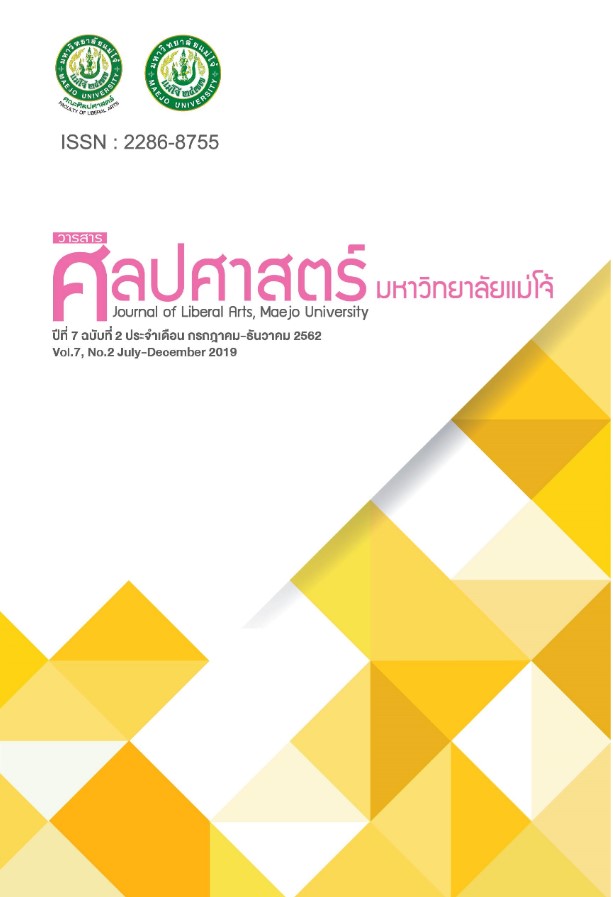An Exploration of Attitudes Towards Transgender People on a Q & A website
Main Article Content
บทคัดย่อ
Online social question and answer (Q & A) websites have become an
important venue for individuals to seek information and voice their opinions through
questioning and answering on a broad range of topics. This study aims to explore
people’s attitudes towards transgender people on a social Q & A website based
on the ‘attitude’ system in appraisal theory. 194 sentences which include the
term ‘transgender’ or something related from the first 100 written answers to the
question “What is your opinion on transgender people?” from the Quora website
were collected as data of the study. After that, each sentence was analyzed and
categorized into each type of the attitude system. The findings of this study reveal
that people tended to have more positive attitudes towards transgender people. For
their expression of positive attitudes, the sentences in the category of ‘judgement’
were mostly used to reveal their opinions that transgender people are normal and
there is nothing wrong with being a transgender person. Negative attitudes towards
transgender people were expressed through the category of ‘appreciation’ to show
their reaction to transgender people’s negative traits.
Article Details
เอกสารอ้างอิง
Anderson, M., & Jiang, J. (2018). Teens, social media, & technology 2018. Pew Research Center. Retrieved 23 July 2018, from http://www.pewinternet.org/2018/05/31/teens-socialmedia-technology-2018/
Bartley, L., & Castro, M.A. (2016). Evaluation and attitude towards homosexuality in the Irish context: A corpus-assisted discourse analysis of APPRAISAL patterns in 2008 newspaper articles. Irish Journal of Applied Social Studies, 16(1), 1-19.
Claman, E. E. (2007). An examination of the predictors of attitudes towards transgender individuals. Unpublished doctoral dissertation, The Ohio State University, Columbus.
Equality Commission for Northern Ireland. (2012). Do you mean me? Discrimination: Attitudes and experience in Northern Ireland, Equality Awareness Survey 2011. Belfast: Equality Commission for Northern Ireland.
Flores, A. R. (2015). Attitudes toward transgender rights: Perceived knowledge and secondary interpersonal contact. Taylor & Francis in Politics, Groups, and Identities. 3, 398–416.
Ipsos. (2018). Global attitudes toward transgender people. Retrieved 20 May 2018, from https://www.ipsos.com/sites/default/files/ct/news/documents/2018-01/ipsos_report-transgender_global_data-2018.pdf
Jobe, J. N. (2013). Transgender representation in the media. Honors Theses. Retrieved 25 May 2018, from https://encompass.eku.edu/honors_theses/132
Jones, P., Brewer, P., Young, D. G., Lambe, J. & Hoffman, L. (2018). Explaining public opinion towards transgender people, rights, and candidates. Public Opinion Quarterly, 82(2), 252–278. Retrieved 20 May 2018, from https://doi.org/10.1093/poq/nfy009
King, M. E., Winter, S. & Webster, B. (2009). Contact reduces transprejudice: A study on attitudes towards transgenderism and transgender civil rights in Hong Kong, International Journal of Sexual Health, 21, 17–34. doi: 10.1080/19317610802434609
Kisha, B. G. (2017). A Study of Attitude of Society towards Transgender in South India. International Journal of Science and Research (IJSR). 6(8), 1564-1569.
Kooy, R. E. (2010). Knowledge and attitudes toward trans persons. Unpublished Master’s Thesis, Humboldt State University.
Lu. L. (2010). Attitudes towards aging and older people's intentions to continue working: A Taiwanese study. INT’L. J. Aging and Human Development, 71(4) 305-322.
Market Share Statistics. (2017). Top 10 social networking sites. Retrieved 20 May 2018, from https://www.dreamgrow.com/top-10-social-networking-sites-marketshare-of-visits/
Martin, J. R. (2003). Beyond exchange: Appraisal systems in English. In S. Hunston & G. Thompson (eds.), Evaluation in text: Authorial stance and the construction of discourse (pp.142-175). Oxford: Oxford University.
Martin, J. R., & White, P. R. R. (2005). Language of evaluation: Appraisal in English. London: Palgrave Macmillan.
Meerwijk, E. L., & Sevelius J. M. (2017). Transgender population size in the United States: A meta-regression of population-based probability samples. Am J Public Health, 107, 1–8.
Norton A. T., & Herek G. M. (2013). Heterosexuals' attitudes to ward transgender people: findings from a national probability sample of U.S. adults. Sex Roles, 68, 738–753. doi:10.1007/s11199-011-0110-6
Patil, S.. & Lee. K. (2015). Detecting experts on Quora by their activity, quality of answers, linguistic characteristics and temporal behaviors. Soc. Netw. Anal. Min, 6(5), 1-11.
Pew Research Center. (2016). A wider ideological gap between more and less educated adults. Retrieved 5 June 2018, from http://www.people-press.org/2016/04/26/a-wider-ideological-gap-between-more-and-less-educated-adults/
Popović, S,. & Milašinović, R. (2016). Model of Advertising Communication in Sport. Sport Mont, 14(1), 33–38.
Read, J., & Carroll, J. (2012). Annotating expressions of Appraisal in English. Lang Resources & Evaluation, 46, 421–447.
Rodrigues, A. S. (2013). Linguistic constructions of Appraisal in the novel. The picture of Dorian Gray and its Brazilian translation and adaptations: An exploratory analysis. RBLA, Belo Horizonte, 13(1), 259-285.
Schneiders, M. (2014). Values and preferences of transgender people: A qualitative study. Retrieved 30 May 2018, from http://apps.who.int/iris/bitstream/0665/128119/1/WHO_HIV_ 2014.21 eng.pdf
Shires D.A., & Jaffee K. (2015). Factors associated with health care discrimination experiences among a national sample of female-to-male transgender individuals. Health Social Work, 40(2), 134–141.
Sjostrom, S., Essen, B., Gemzell-Danielsson, K., & Klingberg-Allvin, M. (2016). Medical
students are afraid to include abortion in their future practices: in-depth interviews in Maharastra, India. BMC Med Educ, 16, 8. doi: 10.1186/s12909-016-0532-5
Winter, S. (2006). Thai transgenders in focus: Their beliefs about attitudes towards and origins of transgender. International Journal of Transgenderism, 9(2).
Wu, H. (2013). Appraisal perspective on attitudinal analysis of public service advertising discourse. English Language and Literature Studies, 3(1), 55-66.
Yuan, Q., Abdin, E., Picco, L., Vaingankar, J. A., Shahwan, S., Jeyagurunathan, A., & Subramaniam, M. (2016). Attitudes to mental illness and its demographic correlates among general population in Singapore. PLoS One, 16(11). doi:10.1371/journal.pone.0167297

